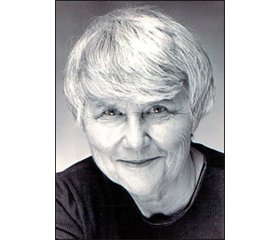I began this blog twelve years ago, during the rehearsals for the LCT staging of Tom Stoppard’s The Coast of Utopia. Elizabeth Smith was the production’s dialect consultant, and I was horridly remiss in not talking to her then. With The Hard Problem, a new Stoppard play, in preparation at the theater, I could not miss the opportunity to speak with Smith, who also worked on LCT’s current My Fair Lady. The other morning, I sat with Smith outside LCT’s light-filled Mailman Rehearsal Room, and attempted to make my amends.
I asked Smith, who grew up in England, to describe her job. “I try to make American actors sound British,” she replied. “That’s most of my work. I don’t do American dialects at all. If I tried to coach a Brit to sound American an American could tell. I wouldn’t have the exact subtleties.”
Smith, who attended Central School of Speech & Drama, in London, in the same class as Vanessa Redgrave and Judi Dench, does not work with American actors primarily the way that Henry Higgins works with Eliza Doolittle. “What I do is more than phonetics,” Smith Said. “I try to find something that’s right for the actor in terms of the character and the context of the play. Dialect is tricky because it’s influenced culturally and geographically. And now social media has done a number on it.”
Mentioning a young British actor in The Hard Problem, Smith explained, “There’s a huge difference between somebody of Chris O’Shea’s generation and somebody of my generation. “When I was his age RP” – received pronunciation, once called the King’s English – “wasn’t considered unusual. Now it’s considered posh – and that’s not a compliment.”
With The Hard Problem, Smith said she has to play especially close attention to the generational evolution of spoken English. “Most of the characters are young, so I have to be very careful that I don’t give them a British pronunciation that’s on the way to being obsolete. This is more complicated than one might think. When I began coaching and teaching the demarcation between RP and the accents of other classes was very clear-cut. Not anymore.”
I asked Smith to sketch her professional evolution. She said that after finishing at Central School she began assisting her voice teacher from there at another place in London, the Royal Academy of Dramatic Art (RADA). “I thought: okay, I’ll do it, but only until I get an acting job.” She taught at RADA for a few years and came to the U.S. when a group from that school was asked to perform in Arizona.
Smith went on: “I decided to stay in this country. I can’t believe I did this – I had no job. But I was in my late twenties and you do these things then. And by a freak chance I got a job at the Neighborhood Playhouse and then a job at Vassar.” Other things – including eventual and ongoing teaching at Juilliard – followed.
Smith has been a dialect consultant on many Broadway productions, including Dirty Rotten Scoundrels, Me and My Girl, and The Elephant Man twice. She has also worked two times on Stoppard’s Arcadia, including its first New York production, at LCT. Other LCT work has included The Rivals, Henry IV, and Oslo. That last was directed by Bartlett Sher, who also staged LCT’s My Fair Lady.
As that musical involves a professor teaching “proper” English to a young woman, was Smith’s experience on it especially challenging? “The challenge was not so much in the subject matter itself,” she replied, “but in the fact that it was such a huge company. The working atmosphere was absolutely marvelous. Bart wove the narrative so beautifully. How he set up the class differences in the first scene was a huge help to me.”
Working on My Fair Lady, Smith added, reminded her of why she has such respect for actors. “Their job is so hard, by which I mean the work that goes into it. Some people think actors are talented creatures who just swan on and open their mouths and there it is. Whereas the truth is that all actors have to work incredibly hard to do their jobs well.”
As for doing her own job well? “I’m only as good as the actors I work with. That’s very important to say.”
The actors in The Hard Problem, Smith said, require especial attention “to clarity of articulation, and I’m not talking about fussy elocution. I mean making the words clear so that the audience can follow the play’s argument. There is a tendency of young people now to speak more quickly than their parents did. I have to respect that reality while making sure that the words, especially the scientific terminology in this play, is understandable. When an audience hears a word like ‘optogenetics’ they have to really HEAR it. Otherwise they’ll be lost. Part of my job is to ensure that we don’t lose an audience.”
Brendan Lemon is the editor of lemonwade.com
